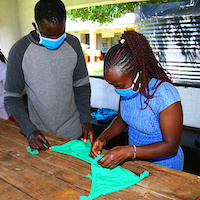Girls for Girls: how hygiene helps education
We promised to tell you more about the Girls for Girls programme in our last blog. Let’s start, therefore, with the most obvious question: how did it come about? In 2010 a Kenyan participant at a meeting of Girl Guide and Girl Scout leaders and trainers was asked, “If there was one thing we could do to assist girls in education, what would it be?”. The answer was to provide access to sanitary products. It might seem a surprising answer at first but it is entirely logical: girls’ attendance at school is likely to be affected by their monthly period — especially if sanitary products are not available. You might also think it is an easily solvable problem. However, the guides, scouts and Friends of Londiani, which worked with them on what became the Girls for Girls (or G4G) programme, discovered that simple availability of sanitary towels was only part of the problem. The state of school washing and cleaning facilities in Londiani at that time was poor. Understanding of personal health and hygiene issues linked to menstruation needed support. And sanitary products can be difficult to find or afford in areas like Londiani. So G4G has had to address much more than just helping girls to access sanitary products. In fact the G4G programme is in three parts. First of all there is hygiene and health education: this involves not just educating the girls themselves but guiding the teachers who will be asked to deliver ten detailed modules on health and hygiene. The next part of the programme is infrastructure development. Friends of Londiani has worked with the Ministry of Public Health and Sanitation, and local schools to design a girl’s latrine and washroom structure. That means talking not just to the ministry but getting the opinions of the girls who will use the latrines (the buildings have been very well received, by the way). Finally, there is economic empowerment; girls can better finance their sanitary requirements when they have money. Alternatively they should not need to feel self-conscious when requesting money for sanitary products from (usually) a male family member. G4G has only been going since 2011 when the pilot was set up, and officially since 2012, but the effect of the programme has already been far-reaching. More girls are spending more time at school, of course, but also more people are talking about (and understanding) a subject once largely ignored. We’re mentioning this now, not just because it’s important but because it’s timely: international facilitators will be working with FOL Kenya to deliver training courses from early next week. If you want to read and see more (there’s a video too) go to http://www.friendsoflondiani.com/projects.php?id=297. You can even donate some money to the programme if you like, in the knowledge that not only does G4G work for a lot of girls but it can — and should — work for many more.

